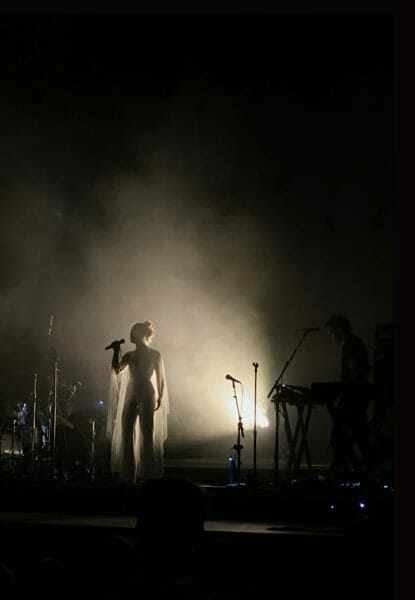Maggie Rogers enters to the pantheistic hymn, “Color Song.” (Charles Belford ’22/Media)
Three years ago, Maggie Rogers was a second-semester senior at New York University, and she found herself in a creative slowdown with her lyrics, even contemplating the idea of becoming a music journalist instead of an artist. This weekend, she performed her first major-label album, “Heard it in a Past Life,” at Express Live. Her recording peaked the US Billboard 200 at #2.
Rogers is a native of Easton, Maryland, a Stars Hollow-esque small town. She learned how to play the harp at seven and began songwriting at 13, along with playing the guitar and piano. Banjo music first charmed Rogers while she was studying at St. Andrews in Delaware, and since then, she has integrated folk inspiration into her musical pieces. By 17, she released her debut album, “The Echo.” Rogers’ intellectual artistry, at that time, was tuned by musicians such as Carrie Brownstein, Patti Smith, Kim Gordan, and Björk.
Rogers attended NYU’s Clive Davis Institute of Recorded Music. She interned with music journalist, Lizzie Goodman, recording and transcribing hours of interviews. Rogers entered her senior year having immersed herself in a musical renaissance in Paris, where she fell in love with electronic and house music. Nearing her NYU graduation, Rogers’ reality changed overnight.
For a master class’s assignment, she wrote “Alaska,” a song that took 15 minutes to write and is about a glacier hiking trip. In this song, Rogers’ transformative journey can be heard through her intricate stringing of meditative vocals with an alluring backdrop of acoustic, folk, and electronic beat exchanges.
“Happy” singer, Pharrell Williams, critiqued her master class. His reaction to her work was videotaped and published online, and he was not the only one to be left speechless.
Fast forward to 2019: Maggie Rogers, 25, is on her North American headline tour.
In Columbus on Saturday, September 28, at Express Live, Rogers made a breathtaking entrance, clad in a white pantsuit that was complemented by an ethereal light display, projecting a symbolic impression of purity-fitting for Rogers, who is unapologetically herself. She does not let the distraction of fame or publicity shape her identity. She instead stays grounded to her form of expression-the one found in the complexities of her music. In “Light On,” she describes why this song is one of her most vulnerable and why she had been reluctant to release it. She reflects on the “wave” that was her rise to fame and her initial fear when “the noise got too loud.” Her private life was shattered temporarily, leaving her spiraling. But she sings, “Oh, and I’ll never change.”
Rogers’ voice stretched in an angelic harmony that captivated the crowd. Throughout her 90-minute performance, even the lines to the Late Night Slice and the refreshment stands were abandoned.
After “Retrograde” and “Light On,” she welcomed an encore by beginning an acoustic version of “Alaska.”
She told the audience about her band meditation before every performance, during which she repeats, “May I trust the work that got me here.”
Before singing “Alaska,” her origination song, she said, “This song is mine, but it is also yours now, too.”








